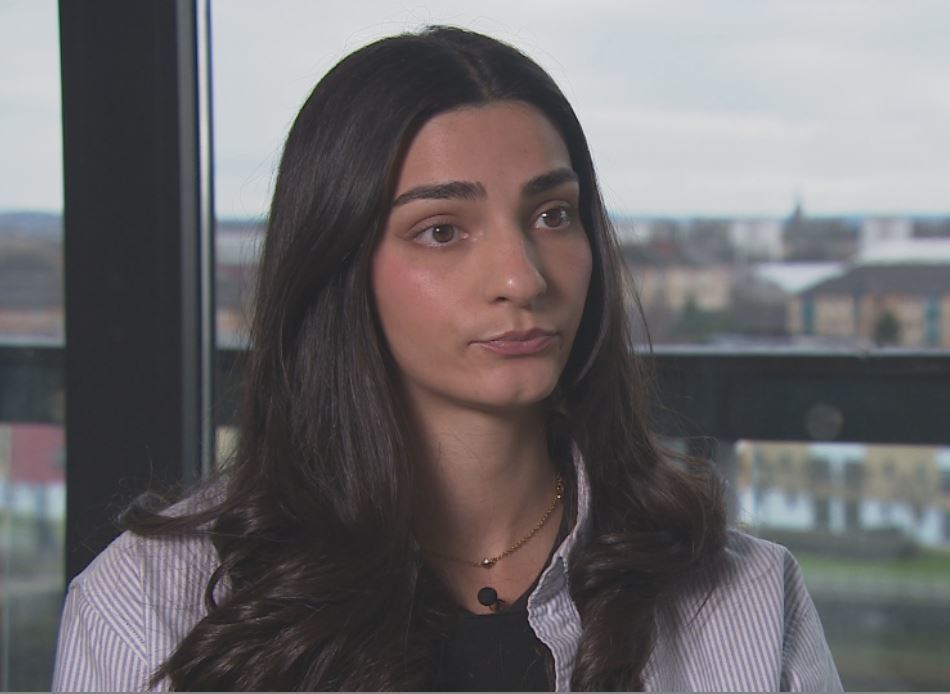A woman who was raped by a fellow student has said “urgent action” is needed to prevent attackers from being on campus.
Ellie Wilson was raped by Daniel McFarlane between 2017 and 2018 while attending Glasgow University.
However, the rapist was allowed to study at Edinburgh University in 2021, despite the institution knowing he had been charged and was awaiting trial.
The requirement for university applicants to disclose criminal convictions was dropped by UCAS in 2018, with the university admissions body citing data protection (GDPR) as the main reason.
Concerns were raised by women’s charities at the time over the safety of the student population, yet the move was hailed by others such as the Prisoners Education Trust as an important step for the rehabilitation of ex-offenders.
After a meeting with UCAS last week, Ellie said the body confirmed it was seeking legal advice on the matter.
Ellie told STV News: “We keep being told by the universities that GDPR is the issue behind why they can’t gather information on criminal convictions, but we know that employers are able to gather that information.
“The test on GDPR is whether it’s proportional and whether it is relevant and I think that, given the university environment, it is very relevant and proportionate for that information to be gathered.”
UCAS chief executive Clare Marchant confirmed a meeting with Ellie had taken place.
Ms Marchant said: “We made a commitment to look in detail at the issues she highlighted and to continue to discuss the important points raised, with Ellie and other relevant bodies in the sector.”
Recent high-profile cases have shone a light on the risks of dropping the disclosure requirement at universities.
Last month, STV News revealed the transgender rapist Isla Bryson was able to sign up for a beauty course at Ayrshire College while awaiting trial.
Fellow students said that involved having to take their clothes off in front of Bryson – who committed the rapes while living as a man – during lessons in spray tanning.
Rape Crisis Scotland is calling for UCAS to reinstate the requirement for university applicants to disclose serious offences such as rape or sexual assault in order for the institutions to put in place “appropriate safeguards” for students.
Sandy Brindley, from Rape Crisis Scotland said: “We had the Isla Bryson case where students were in quite intimate situations with this person with no idea that they were awaiting trial for rape.
“This just somehow seems incredible to me that GDPR can be used as a reason for putting students in this position. It has to change.”
The Scottish Government has established a working group to look into the data-sharing issues.
Jamie Hepburn, minister for further education, said: “We have to make sure that we are doing everything we can to make sure our campuses are as safe as they can be.
“We are not looking to put this in the never never or kick it into the long grass. This is something I take seriously.”
Universities Scotland said it was working with others to consider whether processes could be improved.
A spokesperson added: “As institutions, we remain open to continuous improvement and to listening to the perspectives of those with lived experience.”
Ellie has yet to receive an answer from Edinburgh University explaining why McFarlane was allowed on campus. The university did not directly address the question when asked by STV News.
Instead, it sent a statement reading: “In accordance with guidance from UCAS, our admissions process does not require applicants to disclose any criminal convictions or ongoing investigations at the point of application, unless their chosen degree is exempt from the Rehabilitation of Offenders Act 1974 or requires membership of the Protecting Vulnerable Groups (PVG) scheme.
“We encourage all other applicants, including matriculated students, to discuss pending charges or restrictions relating to a conviction with us.”
Ellie is expecting an update from UCAS by the end of the month and hopes it will reinstate the requirement for applicants to declare sexual assault convictions.
The 25-year-old said: “I’m not looking for petty crimes to be declared. I think this is about violent crimes, this is about sexual offences, this is about rape. Higher institutions do have a duty of care to their students and at the moment they are failing.
“If you think about it, they [students] are young people away from home for the first time, often with lots of alcohol involved and there are opportunities for those who wish to prey on women when they are at their most vulnerable.”
Follow STV News on WhatsApp
Scan the QR code on your mobile device for all the latest news from around the country




























